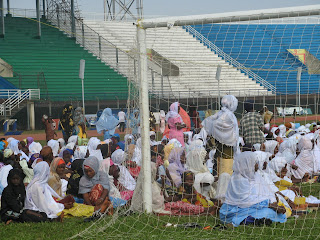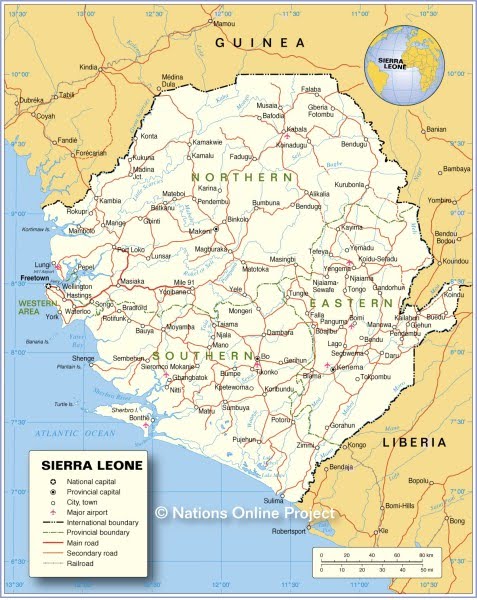

The Celebration of Eid al Adha for Muslims and Christians.
The Jamat Congo Town Mosque is situated between our house and the centre of Congo Town which lies on the estuary of the Sierra Leone River. When liberated African slaves in Freetown arrived in the early part of the 19th Century, they occupied various locations and the place names chosen or given sometimes reflected the origins of the inhabitants, in this case the Congo. As our house is located up a steep hill, a few hundred feet above the mosque, the first call to prayer of the day is heard with clarity and volume as we lie in bed, under a mosquito net, designed to keep the mozzies out but for sound to filter through.
On visiting the mosque for the first time, we were welcomed and shown around the building by the resident caretaker who explained how a former chapel became a mosque in 1958 under the direction of Ulthman Cole, a convert to Islam. Today the well maintained premises would accommodate two to three hundred men and women, within a building where 40-50 people regularly attend the first prayer of the day at 6.30am.
Eid al Adha, or as it is sometimes known Eid Mubarak ( a feast of thanksgiving and sacrifice) involves the story of Abraham and Isaac that is to be found in both the Bible and the Quran, and is therefore of particular relevance to the Christian and Muslim traditions , as an act of trust, reliance and patience, shared by both faiths. (Genesis 22 and the Quran Surah 37 102). This year it fell on November 27th making that day a national holiday in Salone. So with the encouragement of Mr Jullah a practising Muslim who mans the gate of the compound for our house, we made our way to the National Stadium for Islamic prayer.
We were arriving with hundreds of others, all of them Africans and dressed in a variety of clothing styles. Weaving our way through a throng of people with serious infirmities and many of them amputees and all seeking monetary support, I was conscious not just of the collective excitement (that usually accompanies a crowd arriving for a football match but not a usually prayer meeting) but also the mass identity of being a Muslim on this one of the highest days in the Islamic calendar.
Our entry was from the west, so that the several thousand people spread across the football pitch ringed by the eight lane running track were facing away from us and towards Mecca. The stadium’s seating was empty, there were no spectators, so as the final announcements were made with, “go home and make thanksgiving with a goat if you have one or if not a chicken and make a feast to the glory of Allah”, the congregation began to rise. Some of them to have their photographs taken with friends, others unperturbed by the humidity of the languid air and thick lush grass, remained in conversation as though sitting in the goalmouth of a stadium for 36,000 spectators, was a common occurrence.
Janice made the comment that all the church services we have attended so far have usually lasted a minimum of two hours, whilst the prayers in the stadium were completed in less than 20 minutes and yet people are more than willing to make the effort to travel for such a short period. As we walked around the running track among the throng, being within it but not belonging, it was impossible not to reflect on the inter religious relationships between Christian and Muslim within Salone, They are publicly acknowledged as being exceptionally good when compared with its west African neighbours and that they contribute to community and national unity. Quite recently the Methodist Minister for Salem Aberdeen Methodist Church commented that the demographic makeup of the local community, with has a very high percentage of Muslim vis-a-vis Christians, is reflected in church celebrations. This is because so many members of the same extended family are Christians and Muslims. We therefore look forward to attending a delayed Advent service on December 8th , when an attendance by both Muslims and Christians is anticipated, to discover if this affects the shape and liturgy of the service or its duration.


